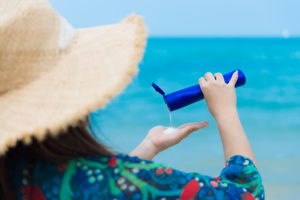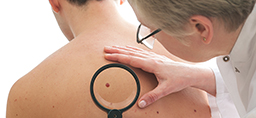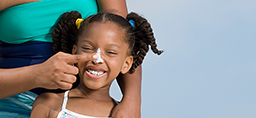
The statistics may be frightening.
Rates for at least two types of skin cancer skyrocketed between 2000 and 2010, according to a study of a Mayo Clinic-led team of researchers.
Using medical records from the Rochester Epidemiology Project, the researchers discovered new basal cell carcinoma diagnoses rose 145 percent, and new squamous cell carcinoma diagnoses rose 263 percent.
Although startling, the study results are not necessarily unexpected as one in five Americans will develop skin cancer during the course of their lifetimes.
But, as dire as the findings are, there are things people can do to reduce their risk of getting skin cancer.
Know your risks
First, people need to know the causes.
Rachel L. Laarman, MD, a pediatric dermatologist with Spectrum Health, said lifestyle changes may be contributing to much of the increased cancer rates. Consequently, people need to be aware of them.
“The lifestyle changes include tanning salons and people wearing skin exposing clothing,” Dr. Laarman said.
To counter this, Dr. Laarman suggests people exposed more than others to the sun—think of people who work outside, runners or swimmers—should wear sun-protective clothing.
“I think those can be very helpful, especially if you spend a lot of time outside,” she said. “Fair-skinned people should wear clothing over sunscreen. Some don’t find it very fashionable, but (sun-protective clothing like rash-guards or sun shirts) have gotten better.”
Wearing sunscreen in the winter as well as in the summer is also a good idea, the doctor said. She suggests that, for most people, sunscreens with SPF ratings of 30 to 50 are best. Also, sunscreens made of mineral blockers, as opposed to chemical sunscreens, should be used because some chemical-based sunscreens may cause allergic reactions.
Dr. Laarman offered the following tips to reduce the risk of developing skin cancer:
- Avoid peak sun hours of 10 a.m. to 4 p.m.
- Wear sunscreen when outside at any time, year-round. Use enough—a full ounce—to get the full result.
- Wear hats and other skin-protecting clothing, particularly a wide-brimmed hat to protect your face and the back of your neck.
- Educate yourself on skin cancer and do self-skin examinations and know what to look for.
- Avoid sunburns by not staying out in the sun for extended lengths of time.
- Know your family history and risk for skin cancer. People with fair skin and moles are at higher risk.
- Avoid all tanning beds and artificial tanning equipment.
 /a>
/a>
 /a>
/a>
 /a>
/a>